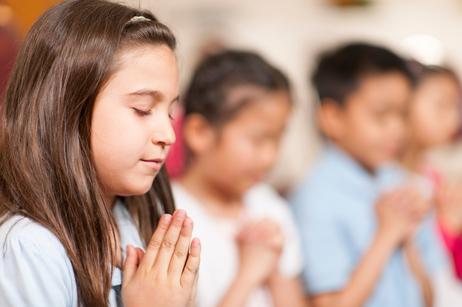One of the main reasons many of us parents look at private schools is because we want our children to receive a religious education. I define a religious education for the purposes of this article as an education which adheres more or less to the religious beliefs which we hold dear. In other words if you are Roman Catholic, you will want to think seriously about educating your child in a Roman Catholic school.
It has been several years since I examined the data on religious schools in the National Center for Education Statistics Private School Universe Survey. This survey covers academic year 2011-2012. So I was fascinated to see that out of the 30,000 private schools in the United States approximately 21,000 were described as religiously-oriented schools. About 9,000 schools were what we call non-sectarian or not affiliated with any specific religion. By comparison there were approximately 99,000 public schools in the 2011-2012 academic year. That would mean that private K-12 schools are educating approximately 30% of school-age children.
Let's review the 25 religious categories which the Private Universe Survey documents.
Roman Catholic: The Roman Catholic Church has always taken its educational mission seriously. As a result about 7,000 K-12 schools educate 1.9 million students. Catholic schools include parochial schools which are largely K-8 schools and diocesan high schools. These schools are mostly organized and administered at the local and regional level. Add to this mix hundreds of schools which were established by the various religious orders - Jesuit, Marist, Dominican, Sacred Heart, and so on - and Catholic parents have a wealth of options to choose from. The principal Catholic school associations are National Catholic Educational Association and the Catholic Boarding Schools Association. The following video gives us a snap shot of Roman Catholic education.
Amish: The Amish run approximately 1,260 religious schools within their local communities. The Amish by their very nature eschew the trappings of the modern secular world. As a result there are no Amish education sites which I could find.
Assembly of God: The Assemblies of God churches trace their beginnings back to 1914. The church currently operates approximately 292 K-12 schools all at the local level. The umbrella association for Assemblies of God schools is the Association of Christian Teachers and Schools.
Baptist: The Baptist churches operate 1,970 K-12 schools. Their accrediting association is the Baptist Schools Accrediting Association
Brethren: The Church of the Brethren sponsors 78 schools. These are run at the local level.
Calvinist: The Calvinist Church operates 107 schools. You can find out more about them here.
Christian (unspecified): This category of Christian churches includes about 4,500 schools. You have many choices under this umbrella. As you might expect there are several Christian school associations including the American Association of Christian Schools, the Association of Christian Schools International and the National Christian School Association. Don't forget to look for Christian school associations in your state as well.
Church of Christ: The Churches of Christ operate 141 schools under the auspices of individual local churches.
Church of God: The Church of God Association Of Christian Schools provides support for the 104 schools of its individual member churches.
Church of God in Christ: The Church of God in Christ provides support for the 23 schools operated by its member churches.
Church of the Nazarene: Nazarene Educators Worldwide is the umbrella organization of the Church of the Nazarene. NEW supports the 63 schools operated by member churches.
Episcopal: The National Association of Episcopal Schools offers support for the 374 schools operated by its member churches. This video describes the Episcopal approach to education.
Friends: The Friends or Quakers operate 87 schools nationwide. These are supported by the Friends Council on Education.
Greek Orthodox: The Orthodox Christian School Association supports the 36 Orthodox schools operated by member churches.
Islamic: The Islamic Schools League of America provides support for the 229 schools operated by local congregations.
Jewish: The 954 Jewish schools in America are supported by several school associations depending on the branch of Judaism to which a particular school is affiliated. These include the North American Association of Community & Congregational Hebrew High Schools, Schechter Day School Network and the Progressive Association of Reform Day Schools.
Lutheran Church - Missouri Synod: The Lutheran Church - Missouri Synod provides support for the 994 schools under its jurisdiction.
Evangelical Lutheran Church In America: The Evangelical Lutheran Church in America offers its 120 member schools support and guidance.
Wisconsin Evangelical Lutheran Synod: The Wisconsin Evangelical Lutheran Synod offers its 336 member schools support and services.
Mennonite: The Mennonite Education Agency provides supports for 736 member schools.
Methodist: The National Association of Schools & Colleges of the UMC is the umbrella organization for the 240 schools affiliated with the Methodist Church.
Seventh-Day Adventist:
The Adventist Accrediting Association oversees the standards and credentials of its 800 member schools. Here is a brief overview of a Seventh Day Adventist school.
Non-sectarian
The 9,750 non-sectarian schools or schools not affiliated with any religious sect tend to belong to state and regional independent school associations.
Use the links above to begin the process of drilling down to find the local information which you need. Like the schools which these organizations serve the various associations are unique and independent of each other. They set their own rules and regulations. You will have to do your own careful due diligence in order to determine if a specific school in your area meets your particular requirements as far as religious education and academics are concerned.
Within any broad religious grouping you will find all kinds of variations. Some schools will be very conservative while others will be more progressive. Be sure to ask if you have questions about what religious emphasis a school has as part of its curriculum.
Because most religious schools are affiliated with a local congregation, they tend to have lower school fees than independent schools. The reason for the lower fee structure is that religious education is considered to be part of the church's mission.
What if you are not a member of that religious organization, can you send your child to one of their schools? It depends. Each local school will have its own rules and regulations. Generally speaking, as long as you agree to have your child participate in all of the school's classes and programs, you should be good. But ask. Always ask. Members of that particular religious grouping will most likely receive preferential treatment on fees, for example.
If your religion really matters to you, you have the option to send your child to a religious school and be educated in your religion's beliefs and teachings.























